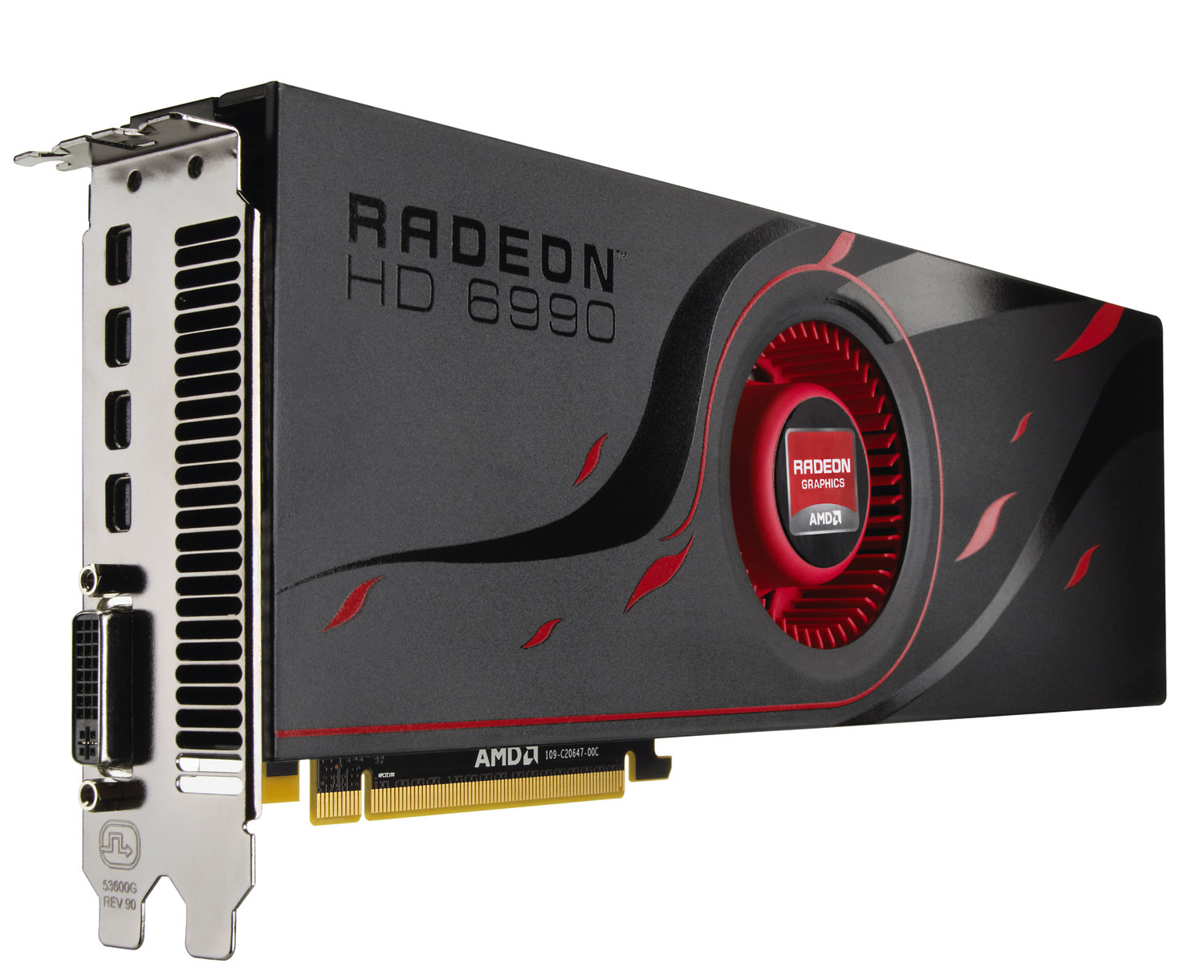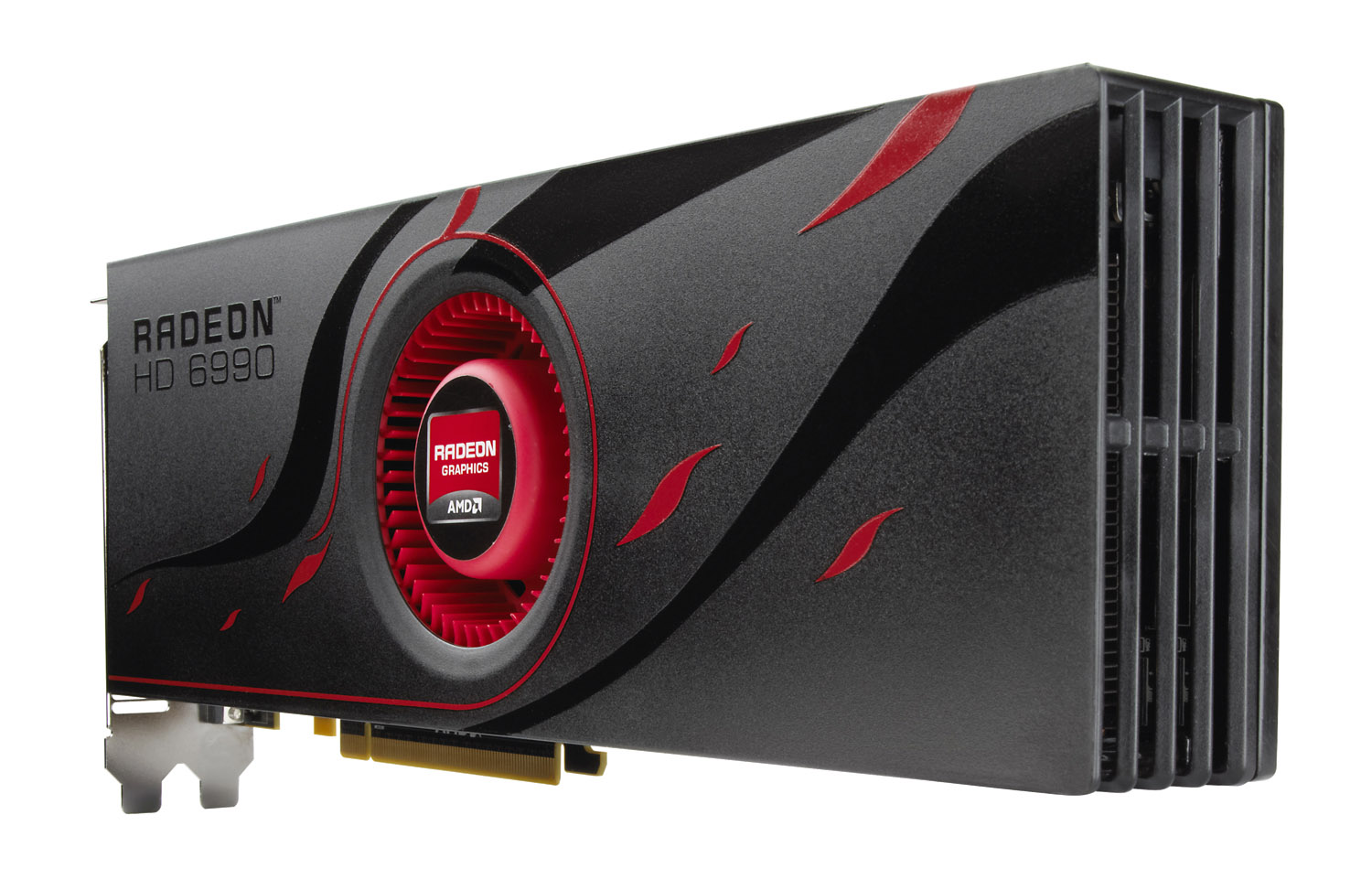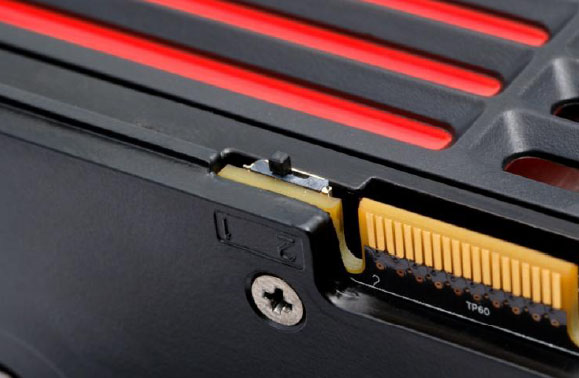AMD Radeon HD 6990 4 GB Review: Antilles Makes (Too Much) Noise
Several months late and supposedly only a couple of weeks ahead of Nvidia's own dual-GPU flagship launch, AMD's Radeon HD 6990 has no trouble establishing performance superiority. But does speed at any cost sacrifice too much of the user experience?
Radeon HD 6990: Power, Cooling, And Size--All Extreme
The Radeon HD 6990’s specifications are impressive, to say the least. Enabling them wasn’t easy. And in the process, AMD busted right through the PCI Express 2.0’s 300 W electro-mechanical specification for graphics cards (the Radeon HD 5970 ducked under it with a maximum board power of 294 W).
Officially, the Radeon HD 6990 is rated for up to 375 W. However, AMD claims it designed the card’s cooling solution to be 450 W-capable. Getting there requires two eight-pin auxiliary power connectors. Do the math and it all adds up: a PCI Express x16 slot serves up to 75 W, and each eight-pin connector is specified to deliver 150 W. That’s 375 W, on the dot.
Basically, AMD engineered this thing right up to the limits of what a second-gen PCI Express card can do within the specification for each of its power sources. And it pulled out all of the stops to get there, including specially-screened low-leakage ASICs (minimizing current leakage helps curtail power consumption), a symmetrical layout, and a purportedly higher-efficiency voltage regulation circuit with greater current capacity (we’d certainly hope so).
PowerTune technology also plays an important role in allowing AMD to maximize the 6990’s clock rates for games, while modulating the card’s thermal output in apps like OCCT, without exceeding the board’s limits. I’ll save you the background on PowerTune (I went into plenty of depth on the fifth page of our Cayman coverage). Suffice it to say, it’s still possible to increase/decrease the PowerTune threshold of this card, if you want to dial in its permitted power consumption more granularly.
It’s hardly a surprise that special effort had to go into cooling the 6990. The PCB is sandwiched on both sides by metal plates providing full-board heat dissipation. A vapor chamber-based heatsink sits on top of each GPU, with phase change thermal interface material between both components. According to AMD, it sees an 8% improvement in thermal performance compared to previous cooling solutions as a result of the gap-closing flow inherent to this class of TIM. A centrifugal fan sits between the two chambers in a mid-mounted orientation. AMD says its gets 20% more airflow from this implementation versus older designs with rear-mounted fans.
That’s the good news. The bad news is a fan in the center means blowing half of your exhaust out the I/O bracket, where you want it to go, and the other half back into your chassis, where you decidedly don’t want it to go (especially when you’re talking about half of the heat from the hottest graphics card ever manufactured). Depending on your build, a mid-mounted fan can be a deal-breaker; it’ll almost assuredly cause complications in a dual-card configuration. But AMD doesn’t provide any guidance whatsoever regarding chassis requirements for this board.
As if to prove it engineered this card beyond what the second-gen PCI Express spec officially supports, AMD takes the dual-BIOS concept introduced on its single-GPU Radeon HD 6900-series cards and puts it to some use. By default, the Radeon HD 6990 runs an 830 MHz core clock at 1.12 V. Flip the switch next to the CrossFire connector, though, and both settings jump to 880 MHz and 1.175 V, respectively, upping the power ceiling to 450 W (clearly, those eight-pin connectors aren't limited to 150 W).
Get Tom's Hardware's best news and in-depth reviews, straight to your inbox.
Now, this still isn’t the same as a Radeon HD 6970 since the memory clock remains at 1250 MHz in both cases. But AMD does facilitate clocks of up to 1200 MHz core and 1500 MHz memory through Overdrive. If you have the will to push this card further, AMD lays the foundation. Be forewarned, though. Even if you damage the card using its built-in second BIOS, warranty coverage won’t apply.
It’s Big, But No Bigger Than Radeon HD 5970
Early shots of vice president and general manager of AMD’s graphics products group Matt Skynner holding Radeon HD 6990 made the card look huge. And it is a big card. But at 12”, it’s no larger than the Radeon HD 5970.
Fortunately, both eight-pin power connectors are located on top of the card, rather than the back. If your case will take a foot-long graphics card, you don’t need to worry about extra clearance back there for cables. You do, however, have to worry about ventilation. Back the board up to a hard drive cage and you’re looking at hampered cooling capacity.
Current page: Radeon HD 6990: Power, Cooling, And Size--All Extreme
Prev Page AMD’s Dual-Cayman Board Mashes The Gas Next Page Display Outputs And AMD's Tessellation Coup-
CrazeEAdrian Great job AMD. You need to expect noise and heat when dealing with a card that beasts out that kind of performance, it's part of the territory.Reply -
jprahman This thing is a monster, 375W TDP, 4GB of VRAM! Some people don't even have 4GB of regular RAM in their systems, let alone on their video card.Reply -
one-shot Did I miss the load power draw? I just noticed the idle and noise ratings. It would be informative to see the power draw of Crossfire 6990s and overclocked i7. I see the graph, but a chart with CPU only and GPU only followed by a combination of both would be nice to see.Reply -
anacandor For the people that actually buy this card, i'm sure they'll be able to afford an aftermarket cooler for this thing once they come out...Reply -
cangelini one-shotDid I miss the load power draw? I just noticed the idle and noise ratings. It would be informative to see the power draw of Crossfire 6990s and overclocked i7. I see the graph, but a chart with CPU only and GPU only followed by a combination of both would be nice to see.Reply
We don't have two cards here to test, unfortunately. The logged load results for a single card are on the same page, though! -
bombat1994 things we need to see are this thing water cooled.Reply
and tested at 7680 x 1600
that will see just how well it does.
That thing is an absolute monster of a card.
They really should have made it 32nm. then the power draw would have fallen below 300w and the thing would be cooler.
STILL NICE WORK AMD -
Bigmac80 Pretty fast i wonder if this will be cheaper then 2 GTX 570's or 2 6950's?Reply
But omg this thing is freakin loud. What's the point of having a quite system now with Noctua fans :(



